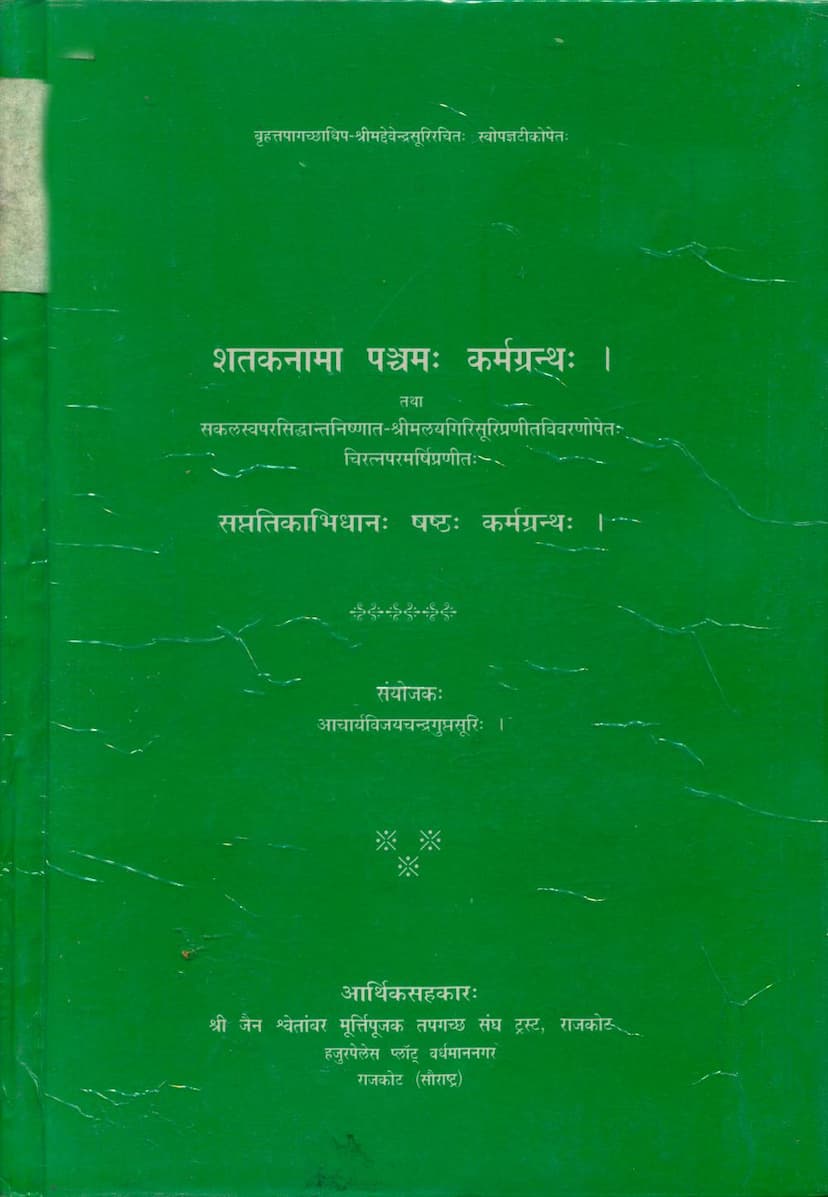Pancham Shataknama Evam Saptatikabhidhan Shashtha Karmgranth
Added to library: September 2, 2025

Summary
Here's a comprehensive summary in English of the Jain text "Pancham Shataknama evam Saptatikabhidhan Shashtha Karmgranth" by Chandraguptasuri, based on the provided catalog link and page descriptions:
Book Title: Pancham Shataknama evam Saptatikabhidhan Shashtha Karmgranth Author(s): Chandraguptasuri (Compiler/Editor) Original Authors: Devendrasuri (for Shataknama), Malayagiri Suri (for commentary on Saptatika), Chiratan Maharshi (for Saptatika itself) Publisher: Jain Atmanand Sabha Catalog Link: https://jainqq.org/explore/004335/1
Overall Summary:
This publication is a significant Jain text that comprises two important karmic granthas (treatises on karma) from the Shataknama and Saptatika traditions. It is presented in two parts:
-
Pancham Shataknama (Fifth Karmagrantha): Authored by Shri Devendrasuri, this work is further enriched by his own insightful commentary (swopagya teeka). It is part of the "Shataknama" tradition, which likely focuses on a systematic or categorical arrangement of karmic principles, possibly in a hundred-fold manner or dealing with hundred topics.
-
Saptatika (Sixth Karmagrantha): Authored by Chiratan Maharshi (an ancient sage), this treatise is accompanied by a detailed commentary by Shri Malayagiri Suri, who is renowned for his mastery of both his own and others' philosophical systems. The "Saptatika" name suggests a focus on seventy or seventy principles related to karma.
The entire work was compiled and organized by Acharya Vijay Chandra Guptasuri. The publication was made possible through the financial support of the Shri Jain Shwetambar Murti Pujak Tapgachh Sangh Trust, Rajkot. The preface highlights the profound scholarly work of Acharya Shri Chaturvijayji Maharaj, who was instrumental in the research, editing, and publication of this and other Jain texts, emphasizing his dedication to scriptural research and the revival of Jain knowledge.
Key Aspects and Content (Derived from page content):
- Compilation and Editing: Acharya Vijay Chandra Guptasuri is credited with the compilation and editing of these two important karmic texts.
- Authorship and Commentary: The publication clearly attributes the original works to Devendrasuri (Shataknama) and Chiratan Maharshi (Saptatika), and their respective commentaries to Devendrasuri and Malayagiri Suri.
- Focus on Karma: The core subject matter is Jain Karma theory, a fundamental and intricate aspect of Jain philosophy dealing with the subtle substances (karma) that attach to the soul due to actions and influence its rebirths and experiences.
- Detailed Subject Matter (from Table of Contents and Prefaces):
- The Fifth Karmagrantha (Shataknama): Likely details various classifications and aspects of karma, including:
- Bonding (Bandh): Differentiating between permanent (dhruv) and impermanent (adhruv) bonding.
- Perversion/Emanation (Vipaka): Four types of vipaka based on field (kshetra), soul (jiva), life-span (bhava), and substance (pudgal).
- Banding Types (Bandh Vidh): Four types: prakriti (nature), sthiti (duration), ras (intensity), and pradesh (quantity).
- Types of Binding (Bandh Swami): Identifying the souls or entities responsible for specific types of karma bonding.
- Classification of Prakritis: Detailed discussions on Ghatiya (mundane) and Aghatiya (non-mundane) karmas, Punyas (meritorious) and Pāpas (demeritorious) karmas, Paravartamana (transforming) and Aparavartamana (non-transforming) karmas.
- Specific Karmic Streams: Detailed analysis of the subtle processes involved in karmic influx and bondage, including the role of passions (kashayas) and mental states (adhyavasaya).
- Language and Meter: The original texts are in Prakrit, utilizing the Arya meter, characteristic of classical Jain scriptures for their lucidity and suitability for philosophical discourse.
- The Sixth Karmagrantha (Saptatika): Likely delves deeper into the nuances of karma, possibly focusing on seventy specific principles or categories. The preface indicates it covers:
- Bandh, Uday, Satta: Detailed analysis of bonding, emanation (result of karma), and existence of karmic particles.
- Prakriti Sthan: Classifications of karmic natures and their respective places.
- Vipaka and Bandh Vidhi: Further details on the perversion and methods of karma.
- Comparisons with Digambara Jain Scriptures: A significant scholarly contribution is a note by Pandit Shri Mahendrakumar Mahashaya comparing the content of these Jain karmic texts with corresponding passages in Digambara Jain scriptures, highlighting similarities and differences in their philosophical perspectives. This adds a layer of comparative religious study.
- Authoritative Commentary: Malayagiri Suri's commentary is highlighted as expert and detailed, providing clarity on the original text.
- Manuscript Research: The publication emphasizes the use of ancient palm-leaf and paper manuscripts for accurate research and editing, indicating a rigorous scholarly approach.
- The Fifth Karmagrantha (Shataknama): Likely details various classifications and aspects of karma, including:
- Scholarly and Historical Context: The preface also pays tribute to the immense literary and research contributions of Shri Chaturvijayji Maharaj, detailing his involvement in restoring and organizing ancient Jain libraries (like those in Patan and Vadodara), his dedicated service to the "Atmanand Jain Grantharatnamala," and his scholarly output. This context underscores the value and preservation efforts associated with this publication.
- Target Audience: The texts are intended for students of Jain philosophy, particularly those interested in the deep and intricate subject of karma.
In essence, this publication presents a vital and detailed exploration of Jain karma theory, combining foundational texts with expert commentaries and modern scholarly compilation, making it an invaluable resource for understanding this core tenet of Jainism.